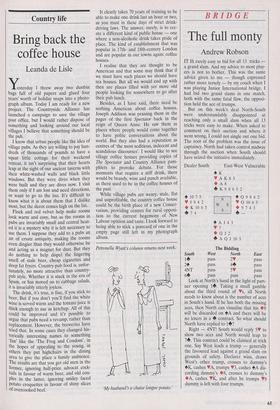BRIDGE
The full monty
Andrew Robson
IT IS rarely easy to bid for all 13 tricks — a grand slam. And my advice to most play- ers is not to bother. This was the same advice given to me — though expressed rather more tersely — by my coach when I was playing Junior International bridge. I had bid two grand slams in one match, both with the same fatal flaw, the opposi- tion held the ace of trumps. But on this week's deal North-South were understandably disappointed at reaching only a small slam when all 13 tricks were easy to make. When asked to comment on their auction and where it went wrong, I could not single out one bid. The root of the problem was the issue of captaincy. North had taken control midway through the auction when South should have seized the initiative immediately.
The Bidding
South
West North East 1+ pass 2V pass 24 pass 4+ pass 4NT pass 5t pass 6+ pass pass pass Look at North's hand in the light of part- ner opening 14. Taking a small gamble about the third round of Vs, all North needs to know about is the number of aces in South's hand. If he has both the missing aces, then North can visualise that his *8 will be discarded on 4A and there will be no losers in a 4 contract. So what should North have replied to 1+?
Right — 4NT! South would reply 5, to show two aces and North would leap to 76. This contract could be claimed at trick one. Say West leads a trump — generally the favoured lead against a grand slam on grounds of safety. Declarer wins, draws West's other trump, crosses to dummy's 4K, cashes VA, trumps 113, cashes 4A dis- carding dummy's *8, crosses to dummy's *A, cashes n, and after he trumps '8 dummy is left with four trumps.


















































































 Previous page
Previous page